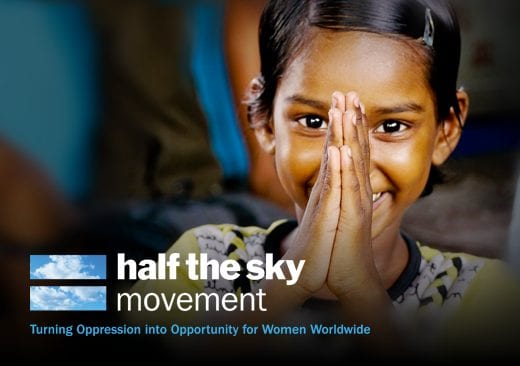 On the heels of Ketchum’s official KSR month in September, Room to Read, Ketchum’s global charitable partner, hosted a discussion with New York Times reporter, Nicolas Kristof and his wife, Sheryl WuDunn, on October 1st to preface the premiere of the feature documentary, Half the Sky: Turning Oppression into Opportunity for Women Worldwide, based on their best-selling book, Half the Sky.
On the heels of Ketchum’s official KSR month in September, Room to Read, Ketchum’s global charitable partner, hosted a discussion with New York Times reporter, Nicolas Kristof and his wife, Sheryl WuDunn, on October 1st to preface the premiere of the feature documentary, Half the Sky: Turning Oppression into Opportunity for Women Worldwide, based on their best-selling book, Half the Sky.
The book, and subsequent filmic adaptation, features the harrowing stories of incredible adversity and abuse faced by of women and girls in developing countries who are regularly subjected to unspeakable gender-based violence ranging from sex trafficking to genital mutilation to maternal mortality. However, Kristof and WuDunn do speak about these issues and on behalf of these women, giving them a voice and working tirelessly to bring these problems to the fore.
The central call-to-action of the Half the Sky movement is that the aforementioned forms of discrimination are, regrettably, a global phenomenon and arguably represent the biggest human rights injustice of our time. Therefore, it is imperative that we begin to swiftly redress the plight of women through heightened visibility and strategic intervention. Moreover, the book elevates females, positioning them as huge sources of untapped potential. By educating and empowering women through programs like that of Room to Read, the cycle of abuse and subordination will begin to break.
Half the Sky has achieved incredible success and galvanized so many people with its captivating personal accounts–both activists who are predisposed to be impassioned about these topics, as well as those who didn’t even know such hardship persists. Therefore, when PBS was commissioned to transform the book into a documentary, it was faced with the challenge of executing a significant mission-related program that has the ability to exist on several platforms and amplify the already-unprecedented reach of the Half the Sky movement.
Similar to the ideology that we as communications professionals espouse, the team at PBS recognized that the crux of this project was storytelling and curating the stories of the girls who, despite being faced with incredible misfortune, are so relatable. As a result, they decided to try to reach mainstream audiences by going beyond book reading and leveraging several different mediums to tell these women’s stories, including educational modules, shortened films for global distribution and an online social action game on Facebook.
While initially hearing the word game in the context of this sensitive issue feels perverse, the game is premised on not only creating awareness in a digestible and interactive way, but also on being transferable to real-world action. For example, as you nurture your fictional community through the different levels, your progress will begin to precipitate actual intervention, thereby blurring the boundary between game-play and real-world, tangible change. The hope is that by creating different opportunities for engagement with this topic and finding several platforms on which to tell the women’s stories, they will gain greater traction.
In spite of the weightiness of the issues explored in the book and film, Kristof’s tone remains optimistic and his overarching intent is to inspire change. He maintains that the humanitarian world has a proclivity to focus so much on the need and problems, but sometimes neglects to highlight the potential for uplifting and transformative change. As seen in the first-hand accounts from his travels, alongside the worst of humanity, you tend to also see the human capacity for altruism, dignity, strength, and resilience.
To better acquaint yourself with the Half the Sky movement and engage with their mission, you can visit www.halfthesky.org.
The story of female adversity in numbers:
- Women comprise of 70% of the world’s poorest people and own a mere 1% of titled land.
- Women aged 15 through 45 are more likely to be maimed or die from male violence than from cancer, malaria, traffic accidents and war combined.
- More than 75 million primary-school age children are not in school. Therefore, 1-in-5 eligible girls worldwide are not going to primary school.
- Over 135 million girls and women have undergone genital mutilation and 2 million more girls are at risk each year
- 603 million women live in countries where domestic violence is not outlawed and 2.6 million women live in countries where rape within marriage is not considered a crime.
- Around 1,000 women die from pregnancy or childbirth-related complications globally every day. That’s 1 every 90-seconds. 99% of maternal deaths occur in poor countries, especially Africa and Asia.
- Trafficking for sexual exploitation is one of the fastest growing organized crimes, generating $27.8 billion per year. An estimated 2 million women and girls are enslaved worldwide.


